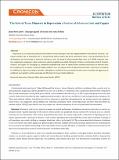| dc.description.abstract | Depression is currently being reduced with selective nutrition therapies such as supplementations with selected nutrients. Adequate nutrition has an important role in mental health status because the brain needs both macro- and micronutrients for its
development and functioning. In particular, deficiency levels of omega-3 polyunsaturated fatty acids (n-3 PUFA), selenium, iron,
zinc, magnesium, manganese, iodine, potassium, sodium, molybdenum, cobalt, chromium, lithium, essential amino acids, B-vitamins,
vitamin C and copper are emerging as a potentially modifiable risk factor for mental illness and their deficiencies or toxicities have
been implicated in a number of mental health conditions over the lifespan, from developmental disorders and mental retardation
in childhood, to depression, bipolar disorder, schizophrenia and borderline personality disorder, stress, hostility and aggression in
adulthood, and cognitive decline, dementia and Alzheimer’s disease in late adulthood. | en_US |

